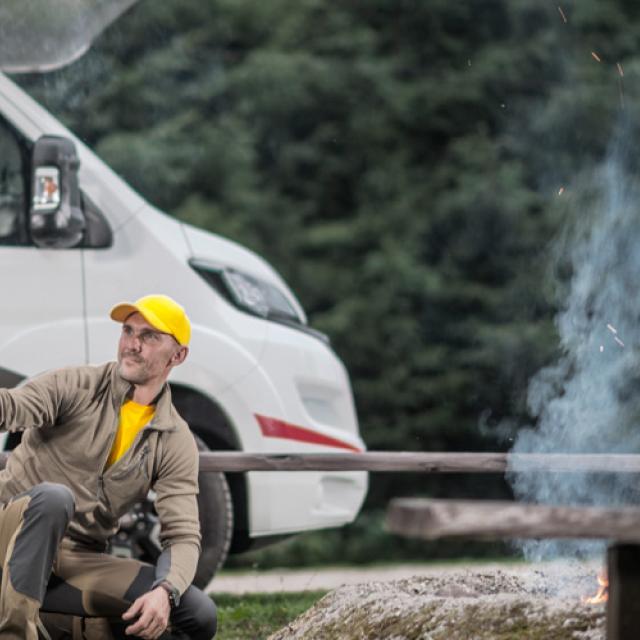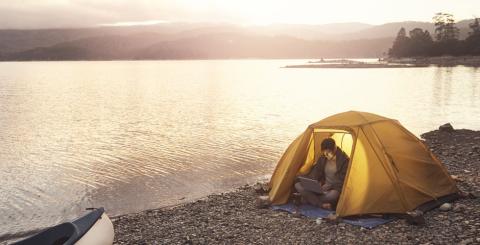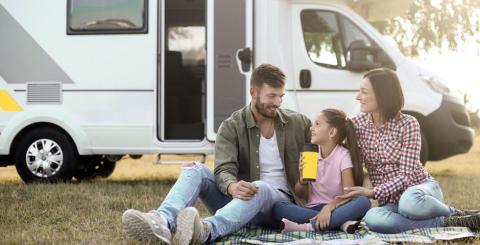Trailer or motorhome: Which is right for you?

Recreational vehicles are for people who prefer to take along a little piece of home when they hit the road. Trailers and motorhomes each have their uses, so it’s best to look at which does what best before getting into all the models there are available. Keep reading for what you need to know.
The differences between trailers and motorhomes
A recreational vehicle is a vehicle or trailer that can serve as a place to live. Some are towed, and others have a built-in engine. The ones you have to tow are called caravan trailers and that ones that have a motorized section and a caravan section rolled into one are called motorhomes. Each type has its own features and includes many different subtypes.
All there is to know about caravan trailers
A caravan trailer is a trailer you can live in. It’s hitched to another vehicle and can be put somewhere while the other vehicle does its thing. Recreational vehicles of this type are often used for camping. They’re entirely dependent on being towed.
The key thing to consider when you hitch a trailer is the towing capacity of the vehicle you tow it with. You’ll find towing capacity on the sticker on the towing vehicle or in your owner’s manual. To properly move your trailer, you need a vehicle with a towing capacity that’s close to 150 kg more than the trailer weighs. That makes it easier to steer and stop.
There are many types of trailer available, mainly differing in design and how they hitch to the towing vehicle. When you buy, you’ll have the choice of:
- A tent caravan, also known as a tent trailer (or a “folding” or “pop-up trailer”) has a tent fabric and frame that folds down into the trailer for easier storage and towing.
- A fifth wheel, on the other hand, hitches high up, on top of the towing vehicle, for easier towing.
- A truck camper, also known as a “box camper” or just plain “camper,” is lightweight, solid, and built to lock into the bed of a pickup truck. The hitching mechanism makes it like a certain type of motorhome.
- A caravan trailer, commonly known simply as a “trailer,” is the form the others are derived from. It’s easy to tow and can be moved around a lot or parked somewhere, at a campsite, for instance.
Besides those types of trailer, there’s also the park model—worth considering for certain needs. It’s designed to be moved quite rarely, to act as a secondary residence. It might be a good choice if what you’re looking for is more of a cottage or cabin than a vehicle for travelling (for which a motorhome would be better). You can’t however insure a park model trailer with car insurance.
All there is to know about motorhomes
A motorhome is self-powered vehicle with an engine in one section and living area in the other. You might also think of it as a beefed-up 4x4 with a big place to live in the back. Some models push the car–trailer interface to the point that the back seats turn around and become part of the living room.
Motorhomes are entirely self-contained and have their own water, electrical, and heating systems. That means you don’t need any special facilities wherever you stop, which makes travelling easier.
Models vary in how they divide the driving cabin from the living area. The choices are:
- Motorized Class C: These have a clear separation between the two vehicle sections and a bigger living area, so they’re ideal if you’re looking for privacy.
- Motorized Class B: The two sections (driving and living) aren’t separated and the seats of the vehicle can be rotated around towards the living room of the living area.
- Motorized Class C: These are luxury two-in-one vehicles in which the two sections aren’t separated at all.
Your choice will depend on how you plan to use your vehicle and what kind of accommodations you want when you’re on the road. What we’ve said about the types of RVs might not however cover everything that matters to you.
Trailer or motorhome?
Choosing between a trailer and a motorhome can be complicated if you don’t have all the answers. That’s why you need to get the facts before you buy. Your decision will include the following:
- Model
- Build quality
- Length and weight
- Hitch system
- Engine and other mechanical equipment
Knowing those things will also help you tell the good RVs from the rest. Remember to add your personal criteria about what you need and can afford.
Driveability
A motorhome is easier to drive than a vehicle pulling a trailer. The trailer needs more room to manoeuvre, and route planning is more complicated because the vehicle isn’t self-contained. Once you arrive at your destination however, you can unhitch your trailer and use your towing vehicle for local errands. A motorhome, on the other hand, can be awkward to get around in after you’ve arrived. A bike might come in handy for local travel in some situations.
Roominess
Both types of RV have similar living quarters, but trailers can often be roomier. Not having an engine makes them easier to maintain too, since you leave the living area behind for motor vehicle maintenance and inspections.
Freedom
Motorhomes give you more freedom than trailers, since they’re built for constant driving around. The water tanks in trailers top out at 40 litres, while motorhomes have tanks that hold up to 110.
Budget
When you buy a motorhome, you’re buying both a motor vehicle and a mobile home, and the price reflects that. Remember however to take the cost of the vehicle towing the trailer into account.
Driving your recreational vehicle safely
You’ve taken all our advice to heart and found the right RV for your needs. Now it’s time to protect your investment and yourself by making good driving a habit and by choosing the best recreational vehicle insurance.
Legal obligations
Want to drive safely? Follow SAAQ’s recommendations on motorhome safety. Before you take your RV out on the road for the first time, make sure you have a Class 5 driver’s licence and get your vehicle registered. Have your vehicle checked—both the part you live in and the mechanical components.
The work to get done will depend on the people and things in the vehicle. For example, if you have small children with you, you need to make sure they’re safe by installing age-appropriate car seats. Check the instruction booklets on children as motorhome passengers to find out what else you need to do.
Remember that everyone else in the vehicle has to wear a seatbelt at all times. That means no getting up, lying down, moving around, or other shenanigans while the vehicle is in motion. And if you’re taking pets along, they also have to be secured when you’re on the road, for example with a harness or in a carrier that’s secured with a seatbelt.
If you’re not used to driving such a big vehicle, take the time to practise steering, backing up, changing lanes, and other driving manoeuvres in the evening when there’s not a lot of traffic. There are also quite a few companies that offer RV driving lessons. As well, you’ll need special trailer insurance or custom motorhome insurance that can help you deal with any potential problems.
Insurance coverage
To stay safe in your RV, you should have the best RV coverage. It will include civil liability insurance (mandatory coverage for damages to others), coverage for vehicle damage (such as collision, fire, and theft), and special coverage for personal property in the living section of the RV. That’s a lot to consider, so choose carefully.
For the RV coverage that’s right for you, you should certainly consider your premiums, but the main thing is to get the protection you might need. Part of that is civil liability insurance, which is mandatory, whether you’re getting motorhome insurance or trailer insurance. It will cover you for things like damages your RV causes to someone else.
Bear in mind that trailer and motorhome insurance both include regular car insurance coverage: all-peril or specified perils, collision, upset, or other dangers like fire and robbery. Motorhome insurance also includes an extension of your home insurance to cover your personal belongings.
Don’t just decide whether you want a trailer or motorhome by looking at what’s available: consider the points raised here. Once you’ve made your choice though, you still need to meet your legal obligations and get the right RV insurance, both to protect your purchase and to make sure nothing comes along and spoils your adventures.



